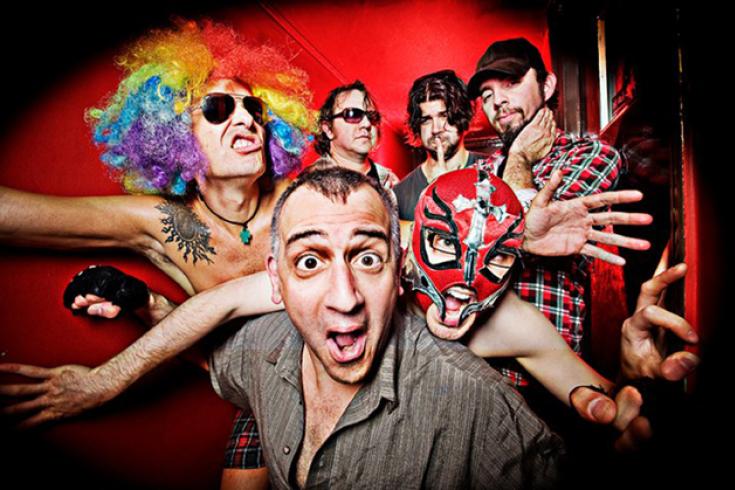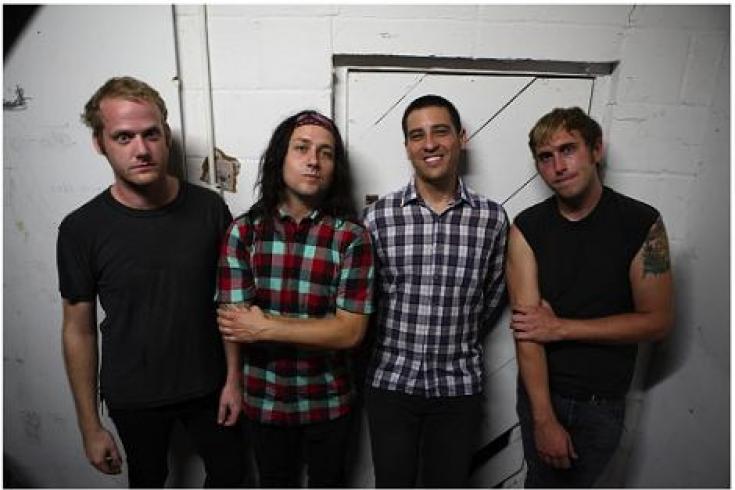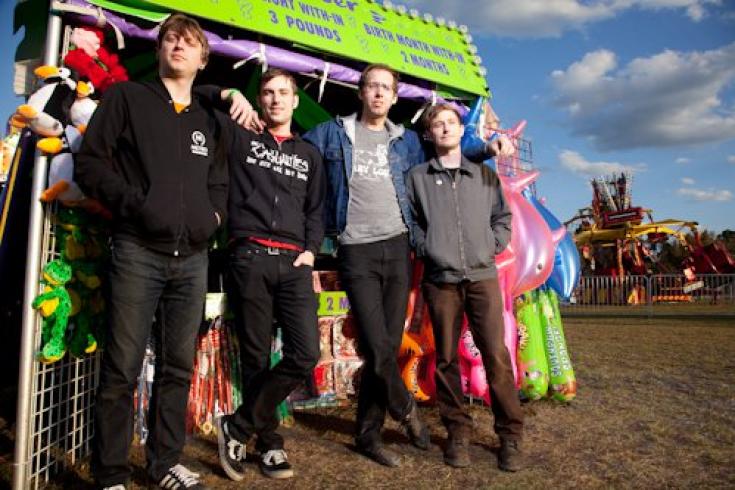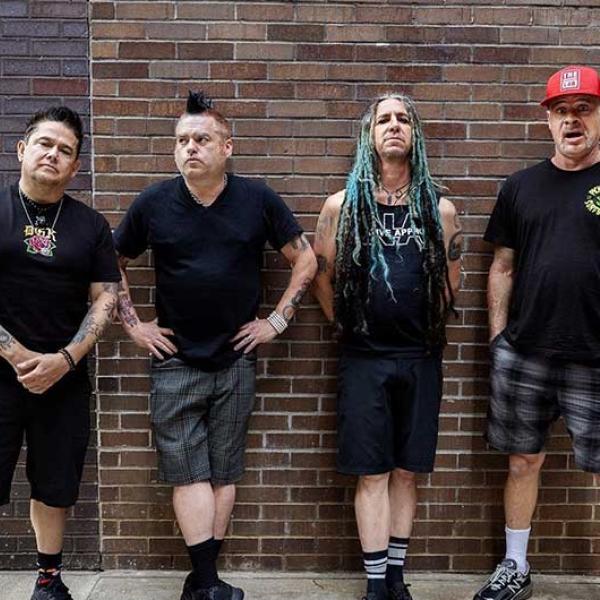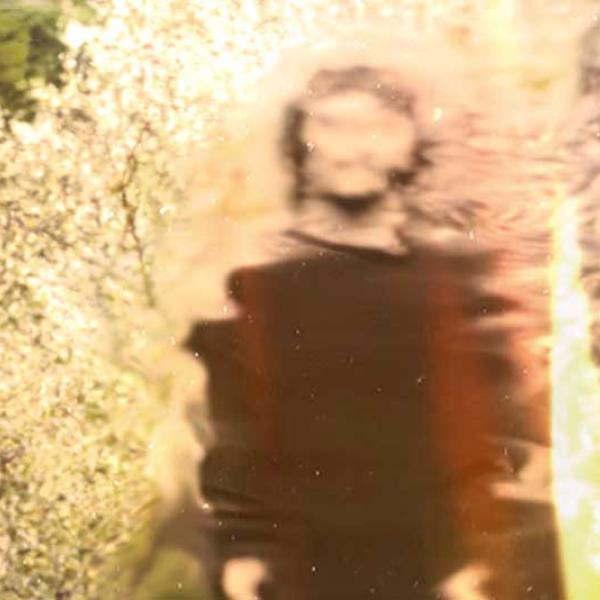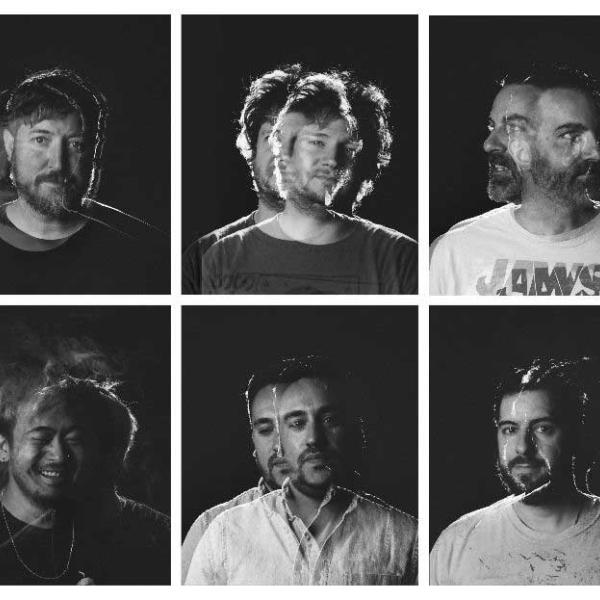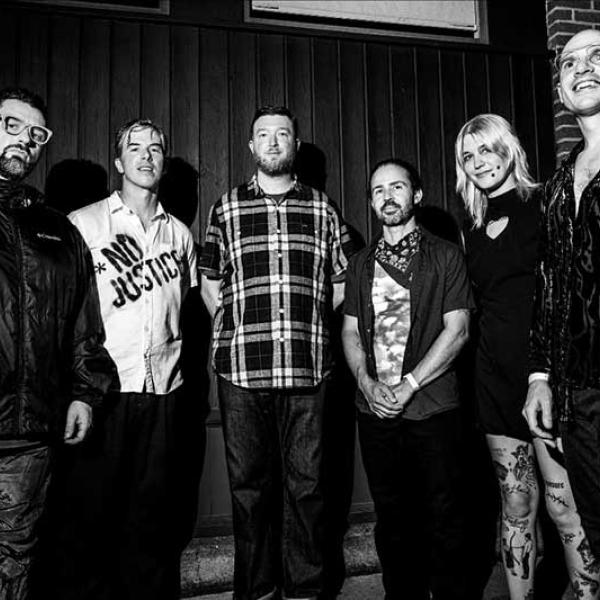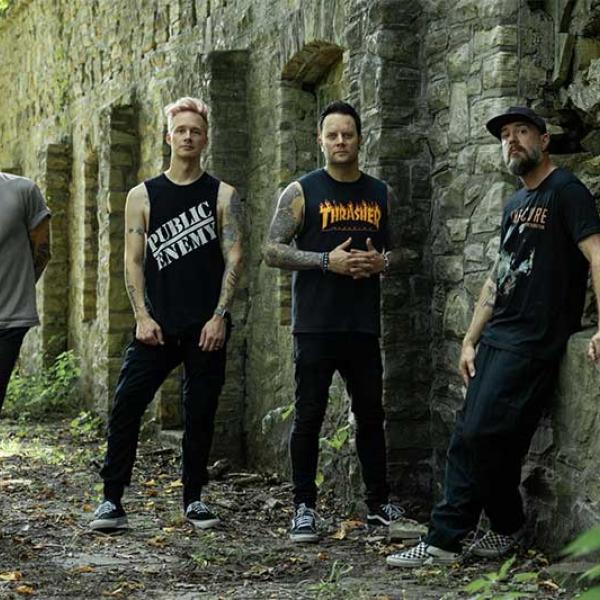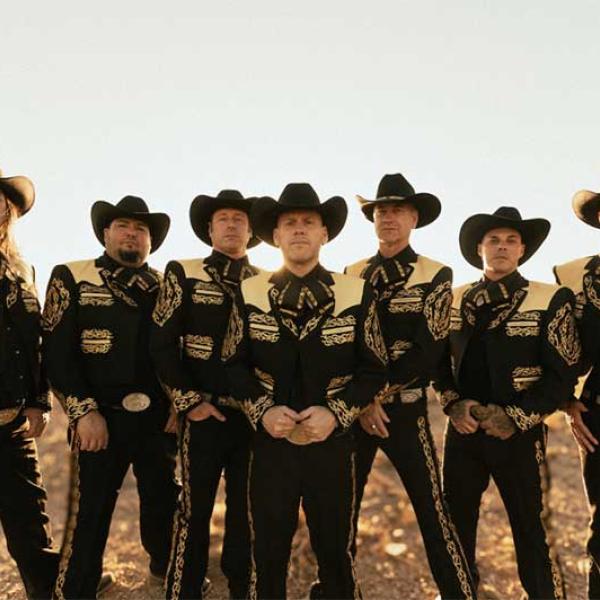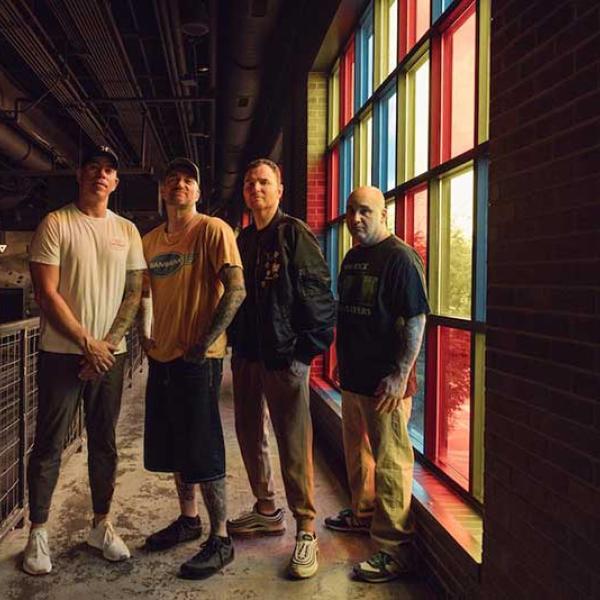Features
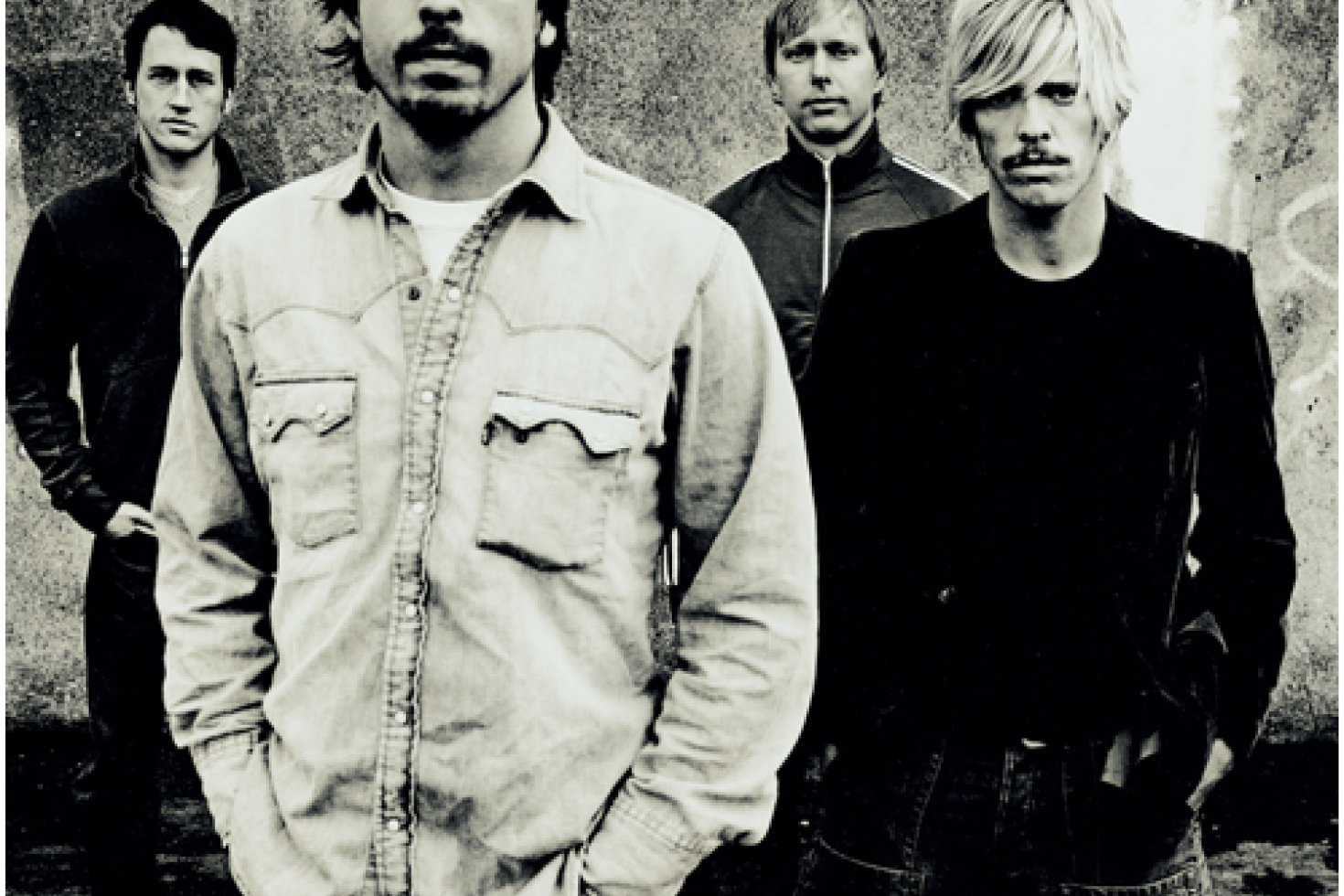
This guy I met one drunken night in Barcelona – he works for the Dutch FHM Magazine – wants something to remember his evening with the Foos by. Too bad for him no camera’s or mobile phones were allowed in the Odeon in Amsterdam. Fear of Internet-leakage, right? But the drunken Dutchie (note: he wasn’t drunk then, but I remember him drunk from Barcelona) seems to be a creative one. He taps drummer Taylor Hawkins on the shoulder and gives him pencil and paper. He then jerks Dave Grohl away from his conversation, assumes a posing position and gives Hawkins the order to start drawing. And to my utmost surprise, Hawkins starts grinning and sketches the twosome. Not that Hawkins has any artistic talent at that. But it sure is a unique souvenir.
And you know, the grin with which Hawkins made the drawing and Grohl did the posing, illustrate the idea of the Foo Fighters perfectly: world’s friendliest rock band.
Of course we would’ve loved to sit down with Grohl earlier that day. He is, after all, none other than the dude from Scream and Nirvana, and occasional session drummer for Queens of the Stone Age, Killing Joke, Juliette and the Licks and a hundred other bands. But the record label didn’t let us choose. We had to settle with Taylor Hawkins and bass player Nate Mendel.
But hey, we weren’t gonna complaini about that either. Hawkins used to play for Alanis Morissete and recently drummed in the new Coheed & Cambria-record. And we can add that he’s one of the most straight forward, honest tell-alls we ever met. Then there’s Nate Mendel, the soft spoken former bass player of Sunny Day Real Estate. Indierock-gods, they were.
During our 25-minute chat (we managed to stay five minutes longer than the other journo’s… hardy-har-har!) we came to the conclusion that all the Foo Fighters are just as friendly as frontman Grohl.
“And that’s hard work”, laughs Mendel. Hawkins interrupts immediately, something that will happen a lot more during the conversation: “Really hard work. We got a bunch of image consultants to keep that up”. Hilarious, Hawkins, hilarious. “No, seriously, you don’t buy the bullshit”, continues the drummer in a more serious manner, “If you see a band like Velvet Revolver, you wonder how they can still be around. There seems to be so much bullshit in that band!”
PRT: Guys, you have a new album out, what would you like to share about it?
MENDEL: “Yes, let us share.” (laughs)
HAWKINS: “Hey man, it’s your job to ask questions.”
PRT: Well, what’s your overall thoughts about it?
MENDEL: “We’re really proud of it?”
HAWKINS: (laughs)
MENDEL: “It’s true though. We were sitting talking to each other. You like the record? ‘Yeah’. Do you like it?’. Yeah! It’s actually pretty good. On the last record, we split things up, and this one incorporates some of the elements of that last one, other musicians, quieter songs. Older quieter songs that we did were kind gimmicky or a novelty or silly. Now we were able to have quiet songs that still are meaningful. It’s on a big scale.”
HAWKINS: “Yeah, everything is kind of extension of old ideas but on a new level. “Come Alive” is an extension of an idea like “Aurora”. What we started with on “Aurora”, ended up in “Come Alive”. It’s a sort of colourful, cinematic type of song in dynamics. It’s not holding back. We didn’t hold back on anything. Dave followed his muses and ideas. He’s always been economical in his approach to music. He’s letting that go a little bit more.”
PRT: I was surprised by “Erase/Replace”, a huge rocksong which will do very well on a big stage or festival.
HAWKINS: “Yeah. I love that song. Our manager hates it though.”
MENDEL: (laughs) “He almost booted it off the album.”
HAWKINS: “It’s got the little middle section that almost turns into Jerry Rafferty/Baker Street-thing with harmonies, smooth, seventies, laid back middle section, in between this almost military rock song or something. (imitates the drum) And that’s an extension of “Low”. It goes along with what I was saying earlier, where a lot of these ideas are built upon older ones, but taken further out.”
PRT: Dave said about “In Your Honor” that it is the ultimate Foo Fighters album. How do you go from that to making a new one?
HAWKINS: “It’s the ultimate ultimate album. It’s the double ultimate. I don’t know, you tend to think every time you make a record it’s the best goddamn fucking thing you ever done. But I didn’t think the last one was the best record ever. I thought it was good, it had some great songs. I didn’t think “One by One” was our greatest record. I thought they had good songs in between okay songs. I don’t know, this album has a whole higher quality, and as a whole it’s less black and white, not a heavy song, light song. Like Nate said, the mellow songs aren’t novelty, they’re real songs.”
PRT: It’s a lot less straightforward as well.
HAWKINS: “Yes, Dave lets things happen that wouldn’t have happened before.”
MENDEL: “Part of it is also thanks to Gil. We worked with him on the second record too. He has some different ideas and is willing to assert himself and free the band to do some things. You have someone there that you can kind of… You don’t have to worry because he’ll tell you when you’re going off too far in the wrong direction.”
HAWKINS: “And he was very into making the music dramatic. Which I remember, when we were in preproduction, working very hard on these songs, I remember that the two common themes of describing things were ‘build’, all the songs sort of build. And ‘drama’.”
MENDEL: “It’s got to remain interesting.”
PRT: What I thought was interesting is, that there are quite a lot of classic rock elements. The soft intro to “The Pretender” for example, reminded me of “Stairway to Heaven”.
HAWKINS: “Sure. I can see that. I was thinking “Eleanor Rigby”, The Beatles. (starts singing).
MENDEL: “I think it’s part of who our band is at the moment. That classic rock thing, the seventies-melancholy vibe, melodic DNA.”
HAWKINS: “And it’s what we grew up on. When the first record came out, I wasn’t even in the band. Me and my brother, that was our album of the year. It’s what we’d listen to when we’d go out and get fucked up. We just thought it sounded like Steve miller on steroids and speed.”
MENDEL: “Which is alright!” (laughs)
HAWKINS: “It is. And the way Dave doubled his vocals, he sounds like Steve Miller. We all grew up on that kind of thing. And you can do what you want, put a different haircut or a different production value on anything. But if it’s rock music or hard rock, it’s never going to stray far from Black Sabbath. If it’s melodic pop rock, it’s never gonna stray far from the Beatles. If it’s country tinged, it’s never gonna stray far from…”
MENDEL: “Nickelback.”
HAWKINS: (laughs) “Why did you have to fucking say that? Say Creedence, The Eagles, Crosby Stills & Nash.”
PRT: The album is also mellower. There’s just a few hard rock songs.
HAWKINS: “If there’s any album it reminds me of, it’s “Nothing left To Lose”. And it’s better than that. I like that. I’ll tell you one thing that definitely affected a couple of songs on the album: Dave got a piano. There are two songs on the record that are a direct influence of someone putting a piano in Dave’s house. Those songs would never have happened had Have not a piano. It’s simple as that. Give him a new instrument, he tinkers around, learns some things and tries to find chords.”
MENDEL: “Just don’t send him anything weird like bagpipes or something.”
HAWKINS: (laughs) “It just opened new door for Dave. And I guarantee you: if we keep making records – which I think we will, since we have a 3 million dollar studio that we have to pay for – you will see more and more of that side. Which is great. Any change for me is great, to a certain degree.”
PRT: It keeps it exciting.
HAWKINS: “Yeah. I don’t think there’ll ever be an electronic influence on our record. I don’t think you’ll ever hear…”
PRT: Timbaland?
HAWKINS: “Timbaland will never come in and produce a track for us. The Game or Jay-Z won’t be rapping on one of our songs. Strike me down if that happens. Kill me if that happens.”
PRT: You’ve been in the Foo Fighters for ten years…
HAWKINS: “Nate’s the original original. I’m just riding his coattails.”
MENDEL: “It’s only a couple of years now, and it seems so long.”
PRT: What were your best and worst moments?
MENDEL: “For once I will be honest, instead of answering Reading, what I always say… Which was great.
HAWKINS: “I’ll tell you what: two days ago was one of our finest moments, Live Earth. Because we are part of something that’s important to us and to the world. Dave was out there in front of the world, and showed that he’s the frontman in the world right now, as far as I’m concerned. He can’t dance like JT, he’s not the greatest singer of all time. But neither was John Lennon.”
PRT: He’s good with crowds.
HAWKINS: “People love him. And he loves people. (laughs) He’s got it, the gift of being himself and being larger than life at the same time. There’s people that are affected.”
PRT: Do you guys feel you’re working in the shadow of Dave?
HAWKINS: “No! We’re quite comfortably holding up his ass.
MENDEL: (nods)
HAWKINS: “That’s our job. Our job at Live earth, of me, Nate and Chris, was to make sure that Dave sounded good. And that’s what a band should be. If there’s a singer, there’s a focal point. That’s what people are mainly going to look at. Of course they also love to see a drummer go off, and see the rest bouncing around. But our job, our little trio, is to make sure that Dave sounds great and that he feels comfortable and can bring it to the people.
So no, if you mean it in a musical sense? No, because we all do things on the side. There are moments in the studio that I’d like to do what I wanna fucking do, and not be told what to do. Let’s try this instead of what your first idea was. But I think it’s that way with anybody who’s the main singer and song writer, you have to kind of follow where he’s going with the song. And Dave happens to be good at all the instruments, so he can sit down and tell you exactly how to do something. That can be a pain in the ass sometimes, but at the same time, he’s usually right. They’re his songs.
MENDEL: “Yeah. Six months after the record’s done, we listened to it whole, and we go: ‘why did we want to change that?’ We lived through that experience a few times.”
HAWKINS: “I’ll tell you one thing. One of the biggest differences, among the things we already covered, is that Nate really got to play bass in a big way on this record. The last couple of records, I felt I wasn’t stoked about the fact that a lot Nate’s style was more suppressed. Dave was going for more a riff-oriented thing where the bass had to follow the guitar. Nate is a busy melodic bass player. With having Gil producing it, also a bass player who’s interested in having interesting parts, him and Nate did the bass by themselves. Then Dave came in, and at first he was slightly taken aback, and then lived with it for a while, and eventually realised it made the music better, and that it’s making him happier and making him enjoying to be in the band even more. It’s all good.”
PRT: What was your worst moment in the Foo Fighters-history?
HAWKINS: “We had some shitty ones.”
MENDEL: “There’s the “One by One”-thing. It was rough, we made a record and it wasn’t right. And it was a turning point. Is this what we wanna do? Will we try to salvage this? It was a scary, disappointing time.”
HAWKINS: “Our heads weren’t in the right place. Dave didn’t really want to be there. He wanted to go play with Queens of the Stone Age. And we were having a hard time making that record. The producer Adam Casper, is a great engineer but no producer. It has one of our best drum sounds ever. But he’s not a producer. Dave was in charge of something and he didn’t even want to be there. We all felt that vibe a little bit, and we tried to do it in a different way. It was a dark time for the band. But in the end, it was one of the most triumphant times. We made it out of that, and then the album came out with two fo our best songs ever, “All My Life” and “Times Like These”, and that’s when we – especially in Europe and Australia – starting to see our growth. In audience acceptance, we made a huge progress.”
PRT: What makes you such a huge band? John Paul Jones, Norah Jones, Josh Homme are coming out to help you out.
HAWKINS: “The biggest collaborator, or guest, on that last record, was Norah Jones. She did the most. Josh and John Paul just played a little guitar part.”
PRT: But you don’t see them on Green Day or U2 albums.
HAWKINS: “I’m sure they would be on a U2 album too.”
MENDEL: “We just asked them.”
HAWKINS: “It’s not because we’re the Foo Fighters. John paul Jones probably didn’t’ even know who the fuck we were.” (laughs)
MENDEL: “That’s one of those question that can make you sound like an asshole. Like, why aren’t people tired of you yet, why do they like you?”
HAWKINS: “I know why. Because we always come up with a couple songs that people like and they’re on the radio. And we always deliver live. We have our own standard of what a good live show for us is, that varies for us. But Dave is always great, and we’ve gotten better. Being a rock band and being a good live band is essential. If you’re not a good live band, you’re fucked.”


